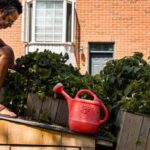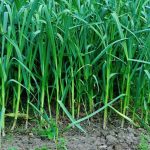Introduction
Dog poop can be a major problem in vegetable gardens, as an animal’s feces in the wrong place can lead to contamination of foodted crops with dangerous bacteria. The presence of dog poop in a garden will also attract unwelcome pests such as flies and other vermin, and the build-up of nitrogenous waste byproducts can have an adverse effect on soil health. Vegetables such as lettuce and tomatoes are especially vulnerable to contamination from dog feces. Furthermore, contact between human skin and the fecal material can cause infection, while animals consuming the produce are at risk of similar infections if they digest contaminated food materials.
It is therefore paramount that owners take extra care to ensure their pets do not leave any messes near vegetable gardens. This is done through proper training of animals to prevent them entering the vegetable patch in the first place, as well as taking extra measures such as fencing off or building barriers around the area, or even covering the vegetables with crop nets. Regularly hosing down fence lines together with cleaning up dog excrement promptly after it is deposited will make sure undesirable animal activities are kept at bay. Owners should also bear in mind that unsightly piles of feces left lying around for prolonged periods can create a hazardous environment for everyone living nearby if toxic parasites and diseases start to spread.
What to Look for When Identifying Dog Poop in Your Garden
If you suspect that your vegetable garden may be affected by dog feces, there are several things to look out for. Firstly, the presence of dog poop itself is a tell-tale sign that some kind of animal activity is occurring in your garden. Secondly, if the feces appears regularly or in large clumps, this could be an indication that a particular animal, likely a stray dog or wild animal, has made it their home and is using it as a restroom. Examining the surrounding area can help further confirm your suspicions — if you find paw prints nearby or unearthed soil where the animal has been digging, then you know that you’re dealing with unwanted visitors in your garden. Finally be sure to take precautions to protect yourself and your family members from any fresh fecal matter — gloves and masks should be worn when attempting to remove deposited waste from the area.
Hazardous Bacterial and Chemical Components of Dog Poop
Dog poop, like any other excrement, can contain a range of hazardous bacteria and chemicals. These pathogens could include salmonella, E. coli, parasites, and roundworms. Additionally, certain pesticides and fertilizers found in dog food can contaminate the soil surrounding your vegetable garden. Dog urine can also pose a hazard to the garden if it becomes too acidic due to high concentrations of urea in it. This acidity can cause tender leafy vegetables like lettuce to burn away instead of producing edible fruits. Furthermore, the heavy use of fertilizers or pesticides on lawns where dogs are allowed to roam can lead to buildups of these chemicals in their poop as well as the soil which may be taken up by vegetable plants growing nearby.
Different Potential Impacts of Dog Poop on Vegetable Gardens
The first potential impact of dog poop in a vegetable garden is nutrient/chemical contamination. Dog feces contain high levels of nitrogen and phosphorous, which can lead to an overabundance of these chemicals in the soil. This can imbalance the garden’s delicate ecosystem, leading to the destruction of beneficial microorganisms, reduced soil fertility, and unhealthy crop growth.
The second potential impact relates to animal pest issues. Dog waste often attracts rodents and other pests that will feed on it leading them into gardens and disrupting the environment. Additionally, since dog poop is typically full of parasites like hookworms or roundworms they may also contaminate surrounding soil as they spread through the dirt. This can result in plants getting infected with diseases like root rot or blights, particularly if crops are planted too close together without good aeration or drainage.
Lastly, dog waste may contain bacteria that could transfer to fruits and vegetables grown in the area; thus placing your family at risk for food poisoning should these contaminated veggies be consumed raw or partially cooked. The bacteria present in this waste product can also infiltrate water sources like wells or rivers if not disposed of properly, posing public health risks from infectious diseases such as E Coli and Salmonella poisoning.
Proactive Steps to Reduce or Eliminate Dog Poop from Your Garden
One of the best ways to reduce or eliminate dog poop from your garden is to create an off-limit area. This means keeping dogs out of the garden, either by fencing it off or installing plastic strips or temporary posts along the perimeter. Adding signs with clear instructions for pet owners can also be effective.
Another proactive step is to install attractive and inviting dog waste containers. Place several around your garden beds so that dog owners have easy access points for disposing of their pet’s waste. Make sure to line the containers with biodegradable bags that you provide, and regularly empty and clean them to avoid foul odors and uncomfortable animal wildlife visits.
You can also reduce dog poop in your garden by training your own pets where you would like their waste deposited instead. Dogs can learn quickly with treats and rewards such as special areas outdoors at a far distance from your vegetable garden specifically for their business needs or using scoopers or flushable bags as part of a larger reward system.
Finally, keep in mind that at times, calling attention to the problem may be necessary in order to stop other pet owners from allowing their animals on your property without permission. You may find yourself having conversations with other pet owners asking them politely not to bring their pets onto your land without notice first, informing authorities if needed, or even investing in motion activated sprinklers set up around your vegetable plots as a deterrent.
Clean-up Strategies for Removing Dog Poop from Gardens
One of the most annoying issues for a vegetable gardener is when their garden is used as a toilet for pets, specifically dogs. The challenge of dog poop in the garden is a widespread issue and removing it can become tiresome and tedious if not managed properly. Here are some strategies for removing dog poop from your vegetable garden:
1. Use a Shovel or Spade: Using either tool is an effective way to remove large chunks of dog poop directly from your garden beds with minimal damage to plants or soil. Be sure to wear protective gloves and dig deep enough so that you get all the waste.
2. Pick up Waste in Compost Bag: If you want to repurpose the poop into compost, consider placing it in a compost bag so you can manage it later on. This is also good if you don’t have access to a shovel right away.
3. Electric Scooper: An electric scooper makes doing this chore fast and easy simply by using an extending handle that acts like forceps able to pick up fresh piles without touching them. It’s the perfect tool for lifting pet waste without having to bend over.
4. Rake Leaves & Grass Clippings: To keep dogs away from going near your garden bed, lay down leaves or grass clippings nearby as these are natural deterrents that help fend off canine intruders from entering the space near your bedding area where vegetables grow best.
5. Animal-resistant Network Fence: Consider putting up a fence around your entire area so that animals won’t be able to enter the space at all and make sure there are no weak spots where they could squeeze through small openings even if they were determined to try and get in!
Preventative Measures for Keeping Dog Poop Out of the Garden
It is important to take preventative measures to keep dog poop out of your vegetable garden. The most effective way to do this is to fence off the area to prevent any dogs from entering the space. Make sure that you have a secure, dog-proof fence that will completely protect the garden. You can also place warning signs around the garden or keep a pet away spray outside of the fence line to warn nearby dogs not to enter. Additionally, if you have a dog be sure it is properly trained and kept on a leash while outdoors. This can greatly reduce the risk of potential pooping in and around the garden bed. Finally, if you see any unwanted dropping quickly scoop them up and dispose of them properly, as this can help keeping your garden clean and safe for your vegetables and fruit!
Conclusion
Dog poop can be hazardous to vegetable gardens for a variety of reasons. The fecal bacteria present in the dog poop can quickly spread and infect a large area, contaminating vegetables growing in the vicinity. Ingesting contaminated veggies is potentially dangerous and could lead to serious illness, especially in children and people with compromised immune systems. The nitrogen content of dog poop can also damage soil fertility and burn the roots of surrounding plants, resulting in wilting or death. Dog poop left in vegetable gardens also attract unwanted pests like flies, skunks, and raccoons that may harm plant growth.
For all these reasons, it is important to pick up after your dog and remove any dog excrement from the vegetable garden before it causes any permanent damage. Taking appropriate steps to prevent this problem is essential for preventing health risks for both yourself and your family.

If you’re looking to get into vegetable gardening, or are just looking for some tips on how to make your current garden better, then you’ve come to the right place! My name is Ethel and I have been gardening for years. In this blog, I’m going to share with you some of my best tips on how to create a successful vegetable garden.





